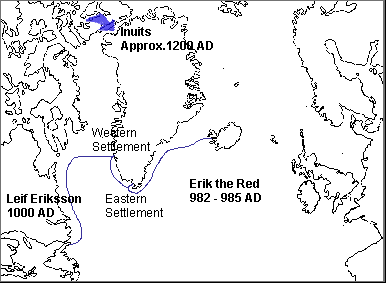Crosby is going to look at where European colonization succeeded and where it failed. Can ecological factors explain why they succeeded in some places and not in others.
After the domestication of the horse, Crosby says Europeans continue to develop for 4,000 years without anything dramatically new. An exaggeration but gets at that Europe was not yet progress oriented.
What caused this to change?
- Christianity has a progressive view of history and caused slavery to almost disappear in the middle ages
- Renaissance brought
more emphasis on the individual, more willingness to
criticize old ideas, more belief that humans can
accomplish new things
- invention of capitalism
- Europe was invaded a
lot and combined a lot of ideas with the need for
defense
three different issues:
- technological
progress--Europe began to pursue technological progress
more steadily than the rest of the world
- being interested in
expanding beyond your boundaries--a new set of ideas
- how does Europe succeed in dominating other parts of the world? Europe began to develop a military and colonial advantage
after the Dark Ages, around 1000 AD Europe began another leap forward, but early attempts at expansion failed
the Scandinavians placed a colony in Iceland about 870 AD
The Norse had a less successful colony in Greenland and explored the east coast of North America
- they were good shipbuilders, less successful farmers
- they were trying to
settle cold areas, not good for farming
- they were driven out of North America by the more numerous natives
- they didn't bring crowd diseases with them because they came from sparsely settled lands themselves
- diseases came
occasionally in ships to the colonies and caused
terrible epidemics among the colonists
- plague killed 2/3 of the population of Norway beginning in 1347 and Iceland beginning in 1402
- didn't figure out
how to profit from colonies
Attempt to conquer the Holy Land--the Crusades--were equally unsuccessful
- Europeans did not have good enough transportation to ever have armies as large as the locals could mount
- they died in large numbers of local diseases, particularly malaria (which they didn't have at home)
- malaria is a disease
mostly found in warm climates, many people there were
resistant genetically (sickle cell trait, thassalemia)
- they weren't adapted to the environment
- the Middle East
being a trade crossroads, the diseases they brought with
them weren't new but rather were already endemic
(continuously present at a low level)
- magnetic compass
- gunpowder
- the stirrup, which some people argue led to the feudal system in medieval Europe
The roots of Western technological progress can be found in these innovations and in the Middle Ages (700-1400). Europe became more technologically advanced than China only after about 1350, but during the middle ages (also known as the medieval period) European technology began to progress (and Europeans came to believe that progress was possible and therefore change was good) while the Chinese increasingly believed that innovation was a bad thing.
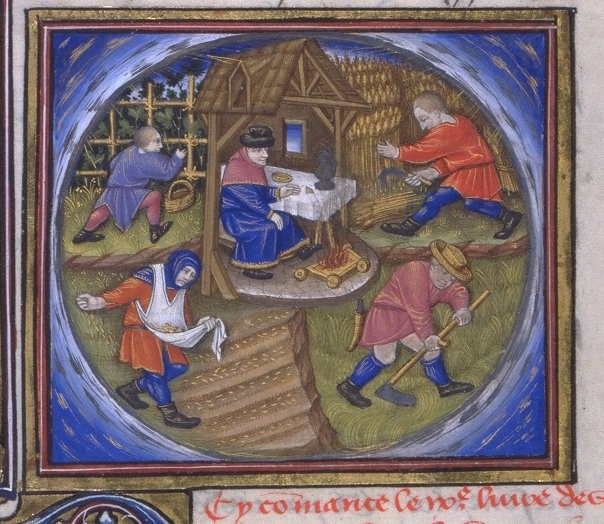
the four seasons, from bnf.fr
Medieval agriculture
- The moldboard plow (8th century)
- required 6 to 8 oxen to pull so led to cooperative farming
- Three field crop rotation (9th century)
- winter wheat or rye
- spring oats, beans, or barley
- fallow
- Horsepower replaces oxen (widespread by 12th century)--horse could work for more hours a day and moved 50% faster
- oats (oxen can work on grass alone)
- the horse-collar (8th-9th century)--allows a horse to pull 4 or 5 times more weight.
- iron horseshoes (common by 11th century) allowed horses to work on wet ground
- the stirrup made possible the mounted knight, creating a demand for more and better horses
- Feudalism
- Manorial System : the serfs (not a slave, but bound to the land--cannot move away) lived in a village and farmed the land communally, giving a share of their labor and the crop to the knight
- the knight and his family lived in the castle and had responsibility to protect the serfs and to fight when called up by the king
- such government as there was was provided by the knights and lords
- this system led to the armies that
fought in the crusades and an interest in military
technology
- the farmers had some opportunity to better themselves by improving farming practices
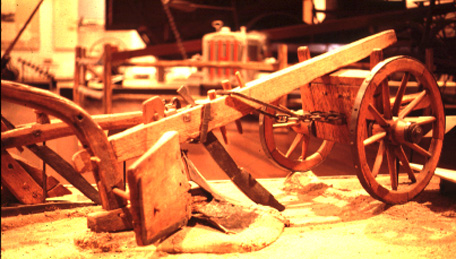
PEM photo: Moldboard Plow, National Museum of American History
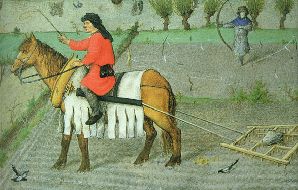
Horse-collar
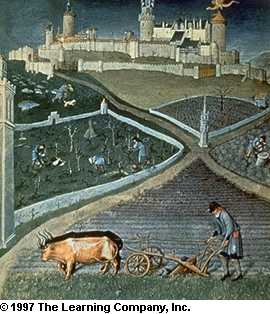
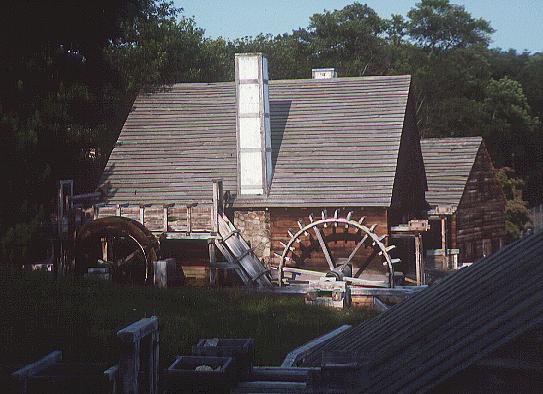
waterwheel at 17th century ironworks
- invented in Roman times but used only rarely through the 5th century
- Spread of the water wheel in the 8th and 9th centuries
- In 1086 the Domesday Book lists 5624 mills in 3000 English communities--an average of one mill for every 50 households
- first mills were floating mills or mills attached to bridges. They first had undershoot wheels (20-30% efficient), then overshoot (50-60% efficient, 13th century) with the water directed by a canal or a wooden millrace
- the invention of the cam allows the conversion of rotary motion into reciprocating motion
- new uses for water power:
- around 1000: fulling wool cloth, beating hemp, water driven trip hammers to break up iron ore
- around 1100 water powered bellows, edge runner wheels to crush olives for oil
- around 1200 saw mills that used water power both to power a rotary saw and to feed in the log
- around 1300 water powered grindstones, pumps to remove water from mines
- damming a river for water power--1177 Toulouse had 3 dams with 43 mills. The largest dam was 1300 feet long
- windmills (12th century) used in areas where land was flat or streams froze in the winter
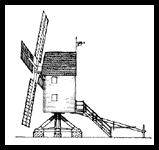
Windmill
In the middle ages there was a technological
revolution
- people are more enthusiastic about new technology
- changes in the social system allowed ordinary people to benefit from new technology
- they are coming
to believe in progress

23. Life and Miracles of Saint Louis
- Christianity prohibited the owning of Christians as slaves so slavery became much less common
- Christianity has a progressive view of history--at some point we will reach the end of history, Gods kingdom will come
- God no longer inhabits nature so nature
can be exploited more freely
- Man's dominion over the earth--new attitude (Genesis 1:28)
- for more on these issues see Lynn
White, The Historical Roots of Our Ecological Crisis
- monasteries developed and spread
technology because they needed it to be self-supporting
on marginal land and because they believed work was
virtuous
- monks work with their hands--the first intellectuals who got their hands dirty ( The Cistercians )
- the invention of the clock in the late 13th century--at a monastery
- motivation to go out and spread Christianity led to expansion

